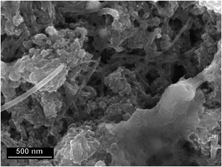Article contents
Fast mechanochemical synthesis of carbon nanotube-polyaniline hybrid materials
Published online by Cambridge University Press: 25 May 2018
Abstract

We present a fast method to prepare hybrid materials of polyaniline (PAni) with carbon nanotubes (CNTs, both undoped and nitrogen-doped) by ball milling without solvents or strong oxidants. PAni forms nanoparticles, attached to CNTs in a nanocomposite structure, with the nanotubes well dispersed among the polymer. This is achieved with only a few minutes of ball milling. Raman spectroscopy confirms that PAni was synthesized in its conductive state and suggests a good CNT–PAni interaction, particularly with nitrogen-doped CNTs. We found that water increased polymer yield, which we optimized, together with the nanocomposite conductivity, as function of amount of water and of oxidant (FeCl3). The nanocomposite conductivity is four orders of magnitude higher than that of PAni, for both types of nanotubes. Scanning electron microscopy and X-ray diffraction both show negligible damage to the CNT during this mechanosynthesis procedure, while dry milling and milling CNT in water without aniline does damage nanotubes, indicating that the reaction absorbs most of the mechanical energy.
- Type
- Article
- Information
- Copyright
- Copyright © Materials Research Society 2018
Footnotes
Contributing Editor: Sarah Morgan
References
REFERENCES
- 6
- Cited by


